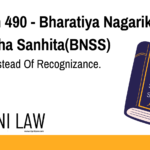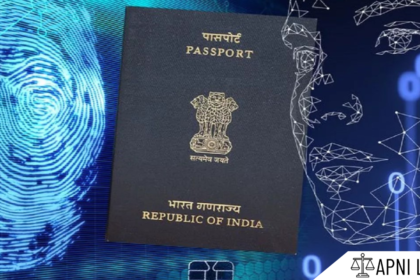Code: Section 496 BNSS
The High Court or Court of Session may direct any Magistrate to levy the
amount due on a bond for appearance or attendance at such High Court or Court of Session
Explanation of Section 496 BNSS
Section 496 of the Bharatiya Nagarik Suraksha Sanhita (BNSS) grants the High Court or Court of Session the authority to direct any Magistrate to enforce the payment of amounts due under a bond related to a person’s appearance or attendance at the High Court or Court of Session.
This provision ensures that the court has the power to enforce bond conditions, making sure that individuals adhere to their legal obligations.
Key Points:
- Authority of High Court and Court of Session:
Both the High Court and the Court of Session have the authority to order a Magistrate to enforce the payment of amounts due under a bond. This applies when a person has failed to meet the conditions set out in the bond, such as attending court hearings. - Enforcement of Bonds:
If an individual is bound by a bond for their appearance or attendance at the High Court or Court of Session, and fails to comply, the court can direct a Magistrate to take necessary steps to ensure that the amount due on the bond is levied. - Role of the Magistrate:
The Magistrate is responsible for ensuring the collection of the amount due. This is an important mechanism for enforcing compliance with legal orders and conditions set by the court.
Illustration
Example 1: Non-compliance with Attendance Bond
Scenario: A person is required to appear before the Court of Session but fails to do so, despite being bound by a bond.
What Happens: The Court of Session directs a Magistrate to levy the amount due on the bond from the individual for their failure to comply.
Example 2: Bond for Appearance at High Court
Scenario: An individual is required to appear before the High Court on a specific date but fails to attend as required by the bond.
What Happens: The High Court can instruct a Magistrate to collect the amount due from the individual as specified in the bond.
Common Questions and Answers on Section 496 BNSS
1. What happens if someone fails to attend the court as required by a bond?
- Answer: If a person fails to appear as required, the High Court or Court of Session can direct a Magistrate to levy the amount due on the bond.
2. Can the High Court directly enforce the payment of a bond amount?
- Answer: No, the High Court or Court of Session cannot directly enforce payment. They can direct a Magistrate to levy the amount due on the bond.
3. What is the role of the Magistrate under Section 496?
- Answer: The Magistrate is responsible for collecting the amount due on the bond when directed by the High Court or Court of Session.
4. Is the power to levy amounts due from bonds limited to the High Court or Court of Session?
- Answer: Yes, Section 496 specifically gives the High Court and Court of Session the authority to direct the Magistrate to levy amounts due on bonds for appearance or attendance before these courts.
Conclusion
Section 496 BNSS ensures that the High Court or Court of Session has the power to enforce bonds for appearance or attendance by directing a Magistrate to levy the amount due. This provision is an important tool in ensuring compliance with court orders and protecting the integrity of the legal system.








